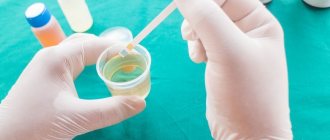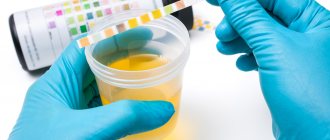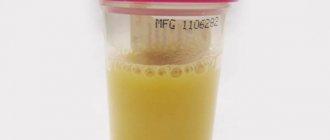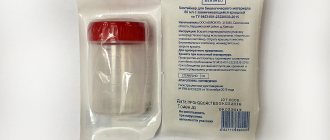Most people know from childhood that tests must be taken early in the morning on an empty stomach. But not everyone has information about whether it is possible to drink alcohol before taking blood, urine and any other tests. In this article we will tell you why drinking alcohol-containing drinks is unacceptable and what the consequences may be.
Important: it is unacceptable to drink alcohol before taking any types of laboratory tests.
To begin with, it’s worth talking about the timing, namely, how many days or hours before you can drink before taking tests. A simple rule works here, based on data on the removal of alcohol from the body. It is worth noting that each patient’s metabolism works individually, so we can only give approximate time frames. For example: 0.5 beer (3-7%) is eliminated from the body within a few hours, and strong drinks (40-50%) - about a day.
Based on these data, we can conclude that it is worth at least 24 hours to stop drinking alcohol-containing drinks. But you should understand that one day may not be enough to completely cleanse the body. That is why the recommended period for the last consumption of alcohol before taking tests is 72 hours. Therefore, if you decide to drink in the evening, and you have an appointment and delivery of biomaterial scheduled for the morning, then you should reschedule the visit.
How long does it take to eliminate alcohol?
You can judge how long it will take before the body is completely cleansed based on the following factors:
Human health. Almost everything you drink is eliminated by the liver, and only a small part of it is excreted by the excretory system. If there are any diseases of this important organ, and people often do not know about them, processing will be more difficult, and the whole process may be significantly delayed. The work of the genitourinary system, respiratory system and sweat glands is no less important.- Weight. It also plays a huge role, because the fatter a person is, the lower the concentration of ethanol will be and the faster the removal of harmful substances will occur.
- Time between appointments. A short period of time between libations will not give you time to recover.
- Floor. In the fair sex, excretion lasts 20% longer than in men. So, for example, a bottle of beer drunk from a man’s body will disappear without a trace after 3 hours, while in women the same effect will be achieved only after 4-5 hours.
- Type of alcohol. It is very important to consider what exactly you are consuming. The more alcohol in the drink, the longer it will take to excrete. Thus, cognac and vodka are the leaders in terms of elimination time.
- Amount drunk. The larger the dose, the harder it is for the body to process it.
How many days does alcohol stay in the blood?
Alcohol has the ability to be hydrophilic.
Due to this property, its highest concentration will be observed where there is the maximum amount of water. For example, in the blood itself the amount accumulated will be many times greater than in plasma.
There are 3 stages of exposure to intoxicating:
- Absorption - begins immediately as soon as the drink enters the oral cavity and continues until the maximum concentration of its level is reached. On an empty stomach this happens almost immediately, unlike the state after eating. The rate of absorption is also affected by carbonation and the presence of related additives.
- Oxidation is a sharp decrease in concentration.
- Excretion is a process where ethanol is actively released into feces, urine, sweat, and even into the air that we exhale. It is these elimination routes that are often used to conduct rapid tests. The discharge period usually lasts from 8 to 12 hours.
For example, weak drinks like beer are removed no longer than after 2-4 hours, champagne and wine – up to 5-6 hours, but it may take a whole day to process vodka or cognac.
Please remember that these are just estimates and may vary due to many of the reasons given above.
Safe amount of alcohol
Alcoholic drinks will not cause damage to the kidneys if you drink no more than 0.5 liters of vodka or a little beer per day, after which you do not drink alcohol for a week.
For an organ, the toxic threshold is 170 grams of pure alcohol over 24 hours. If you consume less than the specified amount every day and remain sober for the next eight days, then the body will recover and the kidneys will not be affected.
With a single intake of more than 170 grams of pure alcohol, the kidneys will be damaged, but they will recover (if you do not take alcoholic drinks for the next 8 days).
If you drink frequently, regularly exceeding the prescribed amount, the kidneys will be damaged and will not be able to recover. The level of their damage will increase and become more serious. Moderate drinking or an overdose of alcohol can lead to dangerous renal impairment.
How long does alcohol last in urine?
When there is no longer alcohol in the blood, this does not mean its complete absence in the body. After all, removing ethanol is the last stage of getting rid of the influence of drinking. On average, laboratory tests can detect ethanol in urine within approximately 5 hours of the excretion stage.
The content of a harmful substance in urine depends not only on the amount consumed, weight, gender or health, but even on the last time you visited the toilet for a minor need. It is almost impossible to say for sure how long it takes for alcohol to completely leave the body.
After an intoxicant enters the body, many transformations occur before it disappears completely. The alcohol breaks down and acedehyde is formed, which later turns into acetic acid. In turn, acetic acid decomposes into water and carbon dioxide. These changes are controlled by the enzymes alcohol dehydrogenase and acetaldehyde dehydrogenase. The time until complete elimination of unwanted elements depends on the activity of these enzymes.
The state of intoxication lasts until acedehyde is formed. Then a hangover sets in until acetic acid is formed. However, there is a standard rate at which ethyl alcohol leaves the human body - 0.1 g of the substance per 1 kilogram in 1 hour. Using this formula, you can calculate for yourself the approximate time needed to remove alcohol.
Also, there are several corrective factors that affect delayed excretion:
individual characteristics of the body in the form of severe hangover symptoms;- poor health at the time of intoxication or illness;
- emotional condition. In a good mood, the state of sobriety occurs much faster than in a bad mood. Not everyone finds drinking to have a relaxing effect, elevating their mood. There are people for whom the effect after drinking is completely opposite.
- In each person, the destruction of harmful substances in the liver occurs differently, even if this organ is completely healthy. This depends mainly on genetic factors.
The effect of alcohol on blood tests
When diagnosing various diseases, blood tests are often performed. It is used to determine the causes of pathology, its form, degree of complexity and many other indicators. To ensure accurate results, it is worth excluding conditions that could change them, including drinking drinks that contain alcohol.
Take note! It is necessary to conduct thorough preparation before taking the tests. It is recommended to stop drinking alcohol and taking various medications 1-2 days before the diagnosis
How does alcohol affect blood tests:
- It causes destruction of the membrane of red blood cells and reduces their mobility properties. When consumed, the quality of blood viscosity increases, the number of red blood cells decreases, and hemoglobin decreases;
- The synthesis of glucose in the liver slows down. Drinking drinks with alcohol before tests can cause an erroneous diagnosis in a healthy person, namely diabetes;
- Increases lactic acid. As a result, incorrect diagnoses may be made that may be related to the heart and blood vessels;
- Increases urea levels;
- Increases cholesterol ;
- Increases the content of neutral fats. As a result of this, the specialist may assume that the patient has problems with blood vessels, cardiac activity, and liver;
- Causes changes in the content of micro- and macroelements. This makes it difficult to determine which substances are required;
- Leads to changes in hormonal levels .
Drinks with alcohol greatly distort blood test results. Erroneous readings can cause the doctor to make an erroneous diagnosis . And this may be a consequence of the selection of incorrect treatment therapy, which as a result can negatively affect health.
Why you need to wait for a state of absolute sobriety and then get behind the wheel
When a person begins to get sober, alcohol is still present in his body. Even if your head has already cleared up, you should under no circumstances get behind the wheel, because the harmful substances have not yet finished their effects. You should not rely on products that promise to completely remove unpleasant odors and traces of intoxication. They will remove only some symptoms, but nothing more. Remember that even a small amount of ethanol in the blood can reduce a person’s reactions. It is much more difficult for the driver to navigate the road, although it seems to him that he is already completely sober and ready to travel. If a person drank 2 bottles of beer, which corresponds to only 0.7-0.8 ppm, his eyes will perceive colors much worse, especially red. There is no point in risking your life and the lives of other people. Wait until the harmful substances leave you on their own.
The effect of alcohol on urine analysis
You should not drink alcohol before taking a urine test, because the drink can change the test results. If drinks with alcohol have already been consumed, then you should not carry out diagnostics the next day; it is better to wait 2-5 days so that ethyl alcohol is completely removed from the body.
Under the influence of alcohol, the following changes in analyzes may be observed:
- There is an increase in urea levels;
- Increased lactic acid;
- Increase in glucose levels;
- If alcoholic beverages contained coloring components, preservatives, or elements to enhance taste, then traces of these substances will be detected in the urine for at least 2-3 days.
To speed up the elimination of alcohol, it is not recommended to drink drugs with a diuretic effect. They will overload the kidneys . Along with harmful components, beneficial substances and a large amount of potassium will be excreted.
How to sober up quickly
Although it is possible to roughly calculate how many hours alcohol is removed from the body, sometimes a situation arises when you need to get back to normal urgently.
A drip and a few simple tips will help you quickly detoxify:
Take as much water as possible. This will lead to an increase in blood volume and, as a result, to a decrease in the concentration of ethyl alcohol in the body. In addition, the kidneys will begin to work more actively, urine will flow faster, accelerating the elimination of unwanted elements. You need to drink water! Tea, coffee or sweet drinks will not give the desired effect.- Give your body exercise. They will lead to the acceleration of chemical processes and faster breakdown of ethanol. Outdoor activity is especially beneficial. But do not overdo it with stress - if you are intoxicated, this can lead to deterioration of well-being and headaches.
- Take vitamin C. It helps increase energy, vigor and strength.
- Eat if you drank on an empty stomach.
- Eat more fruits and greens. These foods contain vitamins and antioxidants, which will also speed up your recovery.
And yet, it is best to control yourself and do not abuse alcoholic drinks. This can lead to much more serious consequences than just feeling unwell.
Features of the influence of alcoholic beverages on test results
You should not drink alcohol before taking tests. Products containing alcohol can greatly change the results , but they are still not the only ones that should be avoided before conducting diagnostics. Nicotine, failure to follow a healthy diet, as well as various drugs cause distortion of indicators.
How does it affect the overall analysis?
When asked whether alcohol can be consumed before blood tests, experts will answer in the negative. Under the influence of alcohol components, research data may be distorted:
- Red blood cells are destroyed;
- Cholesterol levels increase (sometimes it can reach up to 80%);
- Hemoglobin decreases.
The main danger of consuming drinks containing alcohol right before the diagnosis is that they have a strong effect on the concentration of red blood cells. It destroys them, but they are of great importance for health. They transport oxygen from the respiratory system to various organs and tissues, and transport carbon dioxide back to the respiratory organs.
When exposed to ethyl alcohol, destruction of the erythrocyte membrane is observed. This causes disruption of their movements , they stop repelling and stick to each other. As a result, the level of red cells decreases, and this leads to the fact that hemoglobin is greatly reduced. At the same time, microthrombi form and microcirculation deteriorates.
Under the influence of alcoholic drinks, the blood structure becomes viscous. As a result, clots appear that cannot pass through the capillary and vascular walls. And this phenomenon can be dangerous to human life . It interferes with a full blood test.
Impact on the results of biochemical studies
especially affects biochemical blood tests; it distorts the results obtained. This study is complete. Using it, you can discover which components are not enough for the body, and which, on the contrary, are present in excess quantities.
Under the influence of drinks with alcohol, changes in the biochemical blood test are observed:
- Decreased glucose levels;
- Decline in urea levels;
- Cells cannot absorb oxygen at full capacity;
- Deterioration of a person's well-being.
Drinking alcoholic beverages can lead to a sharp decrease in glucose levels. This can be especially dangerous during diabetes.
When drinking alcohol, uric acid levels in the blood decrease, and this can negatively affect health. The doctor may make the wrong diagnosis . Reduced urea levels may indicate that there are severe circulatory problems. Urea is required to remove nitrogen from the body, and if this element is elevated, this may indicate the presence of gout and chronic arthritis.
Alcohol often leads to an increase in triacylglycerols in the blood. These fats are characteristic of pathologies such as atherosclerosis, coronary heart disease, cerebral vascular thrombosis, and viral hepatitis.
Important! Many specialists try not to use alcohol-containing drugs when conducting tests. However, they are believed to be able to detect various infections . But still, ethyl alcohol can greatly change the results, so that even a professional cannot figure them out.
You should not carry out tests after drinking alcohol; it is better to wait 2-3 days. If a patient undergoes a biochemical study while hungover, he may experience the following conditions:
- Fainting;
- The occurrence of prolonged headaches;
- Signs of nausea;
- Vomit.
Usually, when performing a biochemical blood test, a small amount of blood is taken. A sober person will not notice any significant changes. However, alcohol molecules disrupt metabolic processes and negatively affect cerebral circulation.
Impact on the results of blood sampling for sugar
Blood tests for sugar readings are usually prescribed for patients who have metabolic disorders. During the study, a finger prick is performed. If alcoholic beverages were consumed before the analysis, the composition of the blood becomes thick, this creates some difficulties when collecting it, and also increases the risk of blood clots .
Ethyl alcohol has a detrimental effect on the liver. It also negatively affects reagents and the operation of laboratory instruments. For this reason, two different results can occur - increased or decreased blood glucose levels.
1 gram of ethyl alcohol causes an increase in kilocalories to almost 7 units. The fact is that the molecules of alcoholic beverages instantly interfere with metabolic processes. And under the influence of liver enzymes, glucose is formed. As a result, blood sugar levels increase
Drinks containing alcohol can temporarily lower blood glucose levels. It is kept within normal limits for 2.5 hours a day; this is provided by carbohydrates that enter the digestive organs. During the rest of the period, the liver produces glucose; it resorts to reserves in the body. However, alcohol can disrupt this process , which can lead to a drop in glucose.











